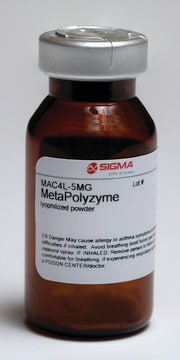MBD6009
5R-PLEX beads
for PCR purification
Synonym(s):
5R-PLEX SPRI beads
About This Item
Recommended Products
General description
Application
- NGS library preparation, including 16S and 18S
- Approved to use in ultrasensitive 5R-Plex (SMURF) library preparation(2,3,4) for degraded samples
- PCR reaction clean up
- Amplicon size selection
- DNA purification and manipulation (replacing elution buffer, concentrating the sample)
Features and Benefits
- Ready to use
- Compatible with automated liquid handling
- Easy size selection by changing the volumetric ratio of beads to samples
Storage Class
10 - Combustible liquids
wgk_germany
WGK 1
Choose from one of the most recent versions:
Certificates of Analysis (COA)
Don't see the Right Version?
If you require a particular version, you can look up a specific certificate by the Lot or Batch number.
Already Own This Product?
Find documentation for the products that you have recently purchased in the Document Library.
Our team of scientists has experience in all areas of research including Life Science, Material Science, Chemical Synthesis, Chromatography, Analytical and many others.
Contact Technical Service








